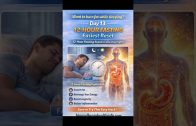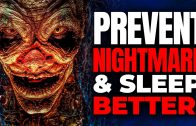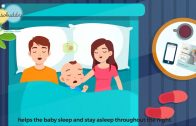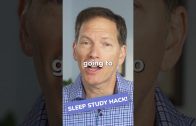Getting a good night’s sleep
This is all the best advice available on getting a good night’s sleep and therefore improving an emotional problem like depression or OCD.
Professor David Veale talks about getting a good night’s sleep. If you’re suffering from depression you might be waking early or repeated waking at night. If you have anxiety, you might have more difficulty in falling asleep. If you have OCD or BDD, you may have delayed sleep because of various compulsions before you go to bed. If you have PTSD, you might have nightmares or avoid going to sleep. All of these emotional problems have consequences: you get excessive daytime sleepiness, less alert, more irritable, and overall you have a poor quality of sleep.
You need to treat the insomnia concurrently with the main emotional problem. Your circadian rhythm or 24 hour internal clock which is entrained by sunlight and linked to melatonin. A disrupted circadian rhythm can lead to disrupted sleep. Normal melatonin (a signal to the brain) production increases in the evening, peaks in the middle of the night and falls by early morning.
Here are the things you need to take a look at if you have some form of insomnia, sleep solutions that aren’t helping or a body clock problem. There are about 25 suggestions:
1. Keep to a routine (single most important thing to do!)
2. When awake, open curtains or in winter use natural dawn simulator or Bright Light Therapy
3. Keep to a routine at night
4. Blue-Light Block in evening to encourage release of melatonin
5. Exercise
6. Napping – no longer than 15 minutes and not after 3 pm
7. Caffeine
8. Nicotine and other stimulants
9. Meals and social life rhythm
10. Alcohol
11. Noise – consider using ear plugs
12. Restless partner
13. De-clutter bedroom
14. Room temperature – 18C or 65F
15. Mobile phones, TVs, tablets
16. Cut out light – blackout curtains or eye mask
17. Mattress or pillow
18. No clock watching
19. Stress
20. Do not associate bed with wake activities
21. The 20-minute rule22. Rigid beliefs23. Body clock problems
24. Worry and rumination25. Medication and physical problems
26. Exclude Restless Legs Syndrome
27. Avoid sleeping tablets
28. Melatonin
If you’re still having persistent disturbed sleep even after following all of these rules, it’s time for CBT for insomnia. This can be delivered by a therapist or sleep specialist. The principles can be read about in this book,’Overcoming Insomnia and Sleep Problems’ by Colin A. Espie or you can follow the Sleepio app. Both of these resources are excellent.
Please do subscribe to my YouTube channel: https://www.youtube.com/channel/UCAW-W6x6ZXGPx53gQ7c_gcg
#ocd #depression #sleep #sleephygiene #insomnia #circadianrhythm
More at https://veale.co.uk
▶︎ Twitter: @drdavidveale
▶︎ LinkedIn: www.linkedin.com/in/veale/
▶︎ Instagram: @veale_david
▶︎ Facebook: Professor David Veale


























